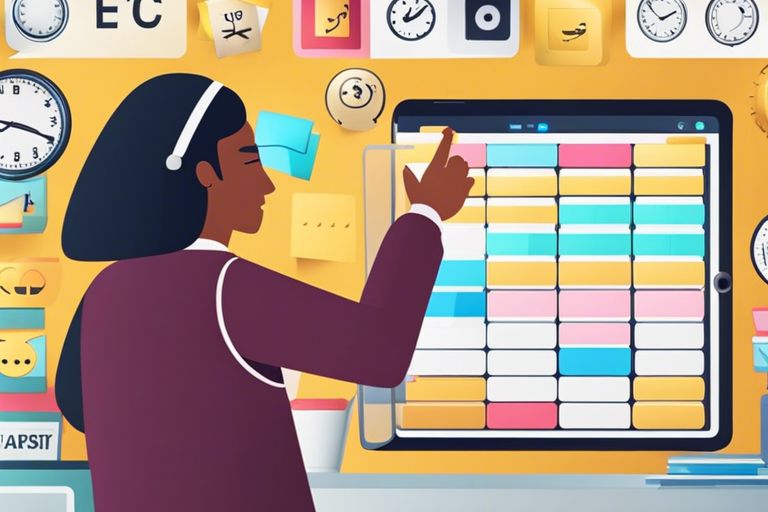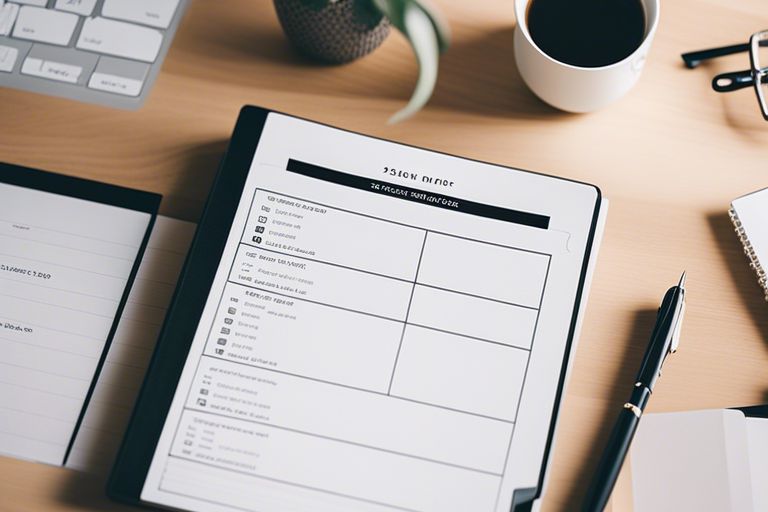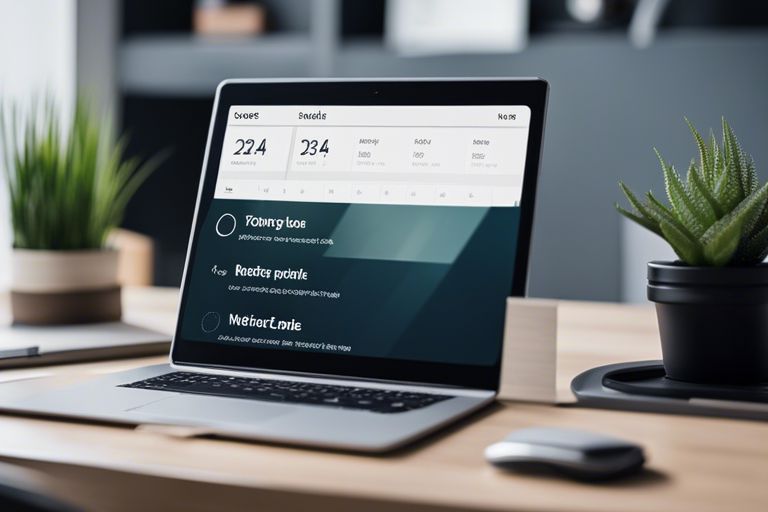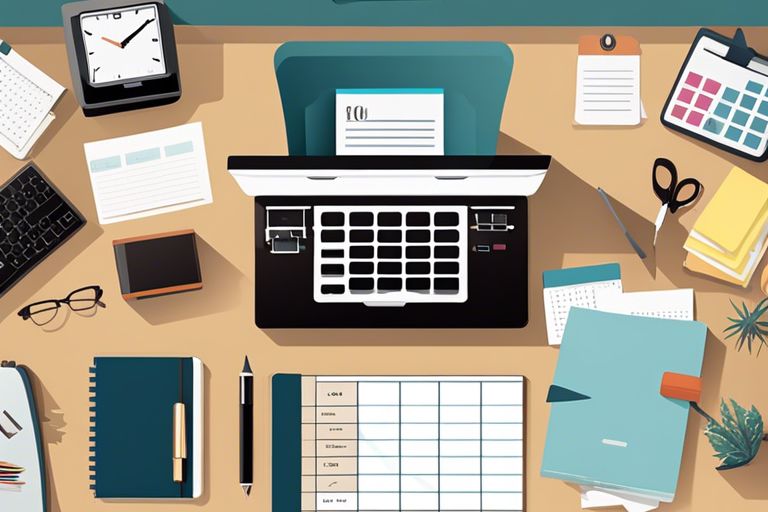How Can You Apply Time Management in Your Life?
Welcome to our article on time management and how you can apply it in your life! Time management is a skill that can greatly enhance your productivity and overall well-being. By effectively managing your time, you can accomplish more tasks, reduce stress, and ultimately achieve your goals. In this article, we will explore the benefits of time management, provide tips for effective time management, discuss the implications of poor time management, and offer strategies for prioritizing your tasks. So, let’s dive in and discover how you can enhance your time management skills and make the most out of your days!
Benefits of Time Management
Effective time management brings a range of benefits that can greatly impact your life. One of the key advantages is stress relief. When you have a clear plan and allocate your time wisely, you reduce the feeling of being overwhelmed and create a sense of progress. Knowing that you are in control of your time can significantly lower stress levels and improve overall well-being.
Another benefit of good time management is that it provides you with more time. By effectively allocating your time to tasks and eliminating unnecessary activities, you free up valuable hours in your day. This extra time can be used for pursuing personal interests, hobbies, or spending quality time with loved ones. It allows you to strike a better balance between work and personal life.
Furthermore, practicing time management opens up more opportunities for you. Employers highly value individuals who are able to manage their time effectively, as it demonstrates reliability and efficiency. Good time management skills can lead to career advancement and increased professional opportunities. Additionally, by efficiently utilizing your time, you can achieve your goals more quickly and have a greater chance of realizing your ambitions.
Improved stress relief
One of the key benefits of effective time management is stress relief. When you have a clear plan and allocate your time wisely, you reduce the feeling of being overwhelmed and create a sense of progress. Knowing that you are in control of your time can significantly lower stress levels and improve overall well-being.
More time for personal pursuits
Another advantage of good time management is that it provides you with more time. By effectively allocating your time to tasks and eliminating unnecessary activities, you free up valuable hours in your day. This extra time can be used for pursuing personal interests, hobbies, or spending quality time with loved ones. It allows you to strike a better balance between work and personal life.
Increased opportunities and goal achievement
Practicing time management opens up more opportunities for you. Employers highly value individuals who are able to manage their time effectively, as it demonstrates reliability and efficiency. Good time management skills can lead to career advancement and increased professional opportunities. Additionally, by efficiently utilizing your time, you can achieve your goals more quickly and have a greater chance of realizing your ambitions.
Tips for Effective Time Management
When it comes to managing your time effectively, there are several key strategies that can help you stay organized, focused, and productive. By implementing these tips, you can maximize your productivity and accomplish your goals more efficiently.
Set Goals Correctly
Achieving effective time management starts with setting goals that are specific, measurable, attainable, relevant, and timely (SMART). Clearly define what you want to accomplish and create a plan to reach those goals. Breaking larger tasks into smaller, manageable steps can make them more achievable and less overwhelming.
Prioritize Wisely
Not all tasks are created equal, and it’s important to prioritize them based on their importance and urgency. Determine which tasks are most crucial to your goals and tackle those first. By prioritizing wisely, you can ensure that your time and energy are focused on the tasks that will have the greatest impact.
Set a Time Limit
Assigning a specific time limit for each task helps you stay on track and avoid spending too much time on any one activity. This sense of urgency can increase your focus and productivity, ultimately allowing you to accomplish more in less time.
Take a Break Between Tasks
Constantly pushing through tasks without taking breaks can lead to burnout and decreased productivity. It’s important to give your brain and body time to rest and recharge. Taking short breaks between tasks can help improve your concentration, creativity, and overall well-being.
Organize Yourself
Staying organized is essential for effective time management. Use calendars, schedules, and to-do lists to keep track of your tasks and deadlines. By having a clear plan and structure, you can avoid wasting time searching for information or trying to remember what needs to be done.
Remove Non-Essential Tasks
One of the keys to effective time management is learning to say no and eliminating tasks that are not essential to your goals or priorities. Assess each task and determine if it aligns with your objectives. By removing non-essential tasks from your to-do list, you free up valuable time for activities that truly matter.
Plan Ahead
In order to stay ahead of your responsibilities, it’s important to plan ahead. Set aside time each day or week to review your goals, evaluate your progress, and plan for upcoming tasks and deadlines. Having a clear roadmap for your day allows you to hit the ground running and make the most of your time.

Implications of Poor Time Management
Poor time management can have significant implications on various aspects of your life, including your workflow, productivity, and overall reputation. When time is not managed effectively, it can result in a disorganized workflow, leading to wasted time and reduced efficiency.
A lack of control over your time can also lead to poor quality of work. Without proper time management, tasks may be rushed or incomplete, negatively impacting the output and the end result. This can not only affect your own work but also have repercussions on your professional reputation.
Additionally, poor time management can create a sense of loss of control, causing stress, anxiety, and a feeling of being overwhelmed. It becomes challenging to keep up with deadlines and deliverables, leading to increased pressure and decreased job satisfaction.
The negative consequences of poor time management include:
- Disorganized workflow
- Wasted time
- Loss of control
- Poor quality of work
- Poor reputation

Determine Your Priorities
When it comes to effective time management, determining your priorities is key. Without clear priorities, you may find yourself overwhelmed and struggling to make progress. One helpful tool for prioritizing tasks is the Eisenhower Matrix.
The Eisenhower Matrix
The Eisenhower Matrix categorizes tasks based on their importance and urgency. It helps you distinguish between tasks that are urgent and important, tasks that are not urgent but important, tasks that are urgent but not important, and tasks that are neither urgent nor important.
By using the Eisenhower Matrix, you can prioritize tasks based on their true significance. This allows you to focus your time and energy on the tasks that will have the greatest impact on your goals and overall success.
By determining your priorities using the Eisenhower Matrix, you can effectively allocate your time and resources. This helps you avoid wasting time on tasks that are not important or do not align with your goals. Instead, you can concentrate on the tasks that will move you closer to success.
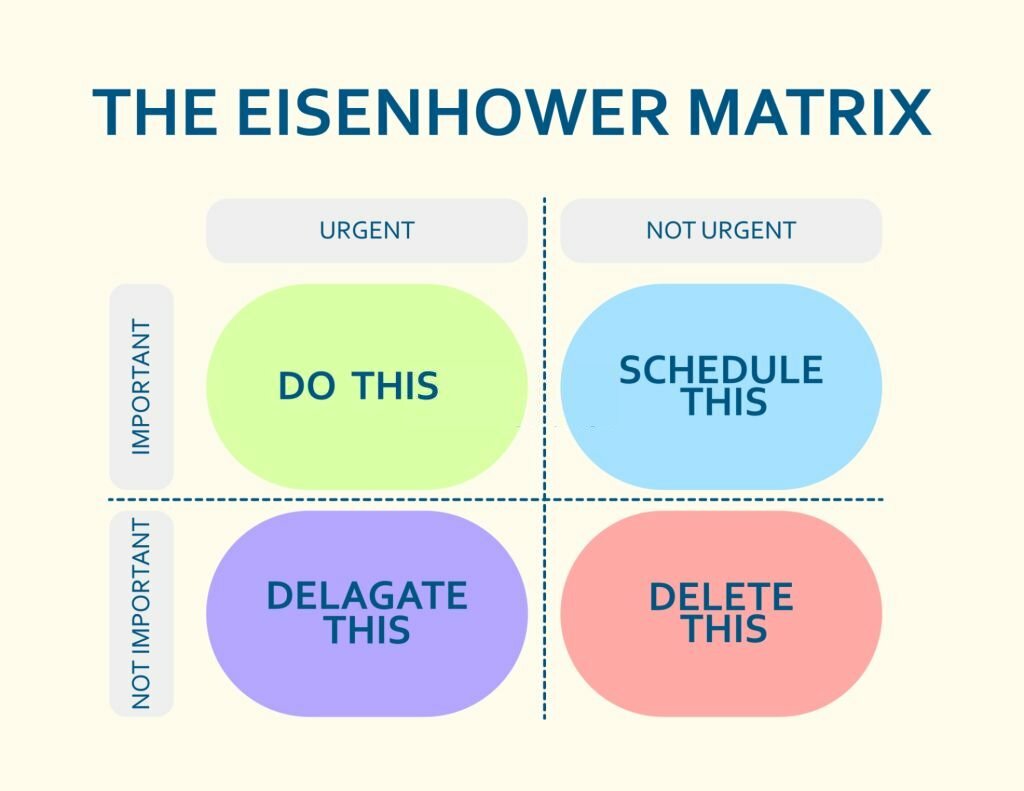
Avoid Multitasking
When it comes to managing your time effectively, one of the key strategies is to avoid multitasking. While multitasking may seem like a productive approach, research has shown that it actually has a negative impact on your ability to focus and complete tasks efficiently.
When you try to juggle multiple tasks at once, your working memory becomes overloaded, causing your productivity to decline. By focusing on one task at a time, you can give it your full attention and work more effectively. This not only improves your productivity but also reduces the chances of making mistakes or overlooking important details.
To avoid the negative impact of multitasking, prioritize your tasks and tackle them one by one. This allows you to give each task the time and effort it deserves, leading to better outcomes and a more efficient use of your time. By avoiding multitasking, you can optimize your productivity and achieve better results in your work and personal life.

Avoid Distractions
Distractions can significantly impact your ability to effectively manage your time. To minimize distractions, it’s important to create a dedicated workspace where you can focus on your tasks without interruptions. Whether it’s a quiet corner in your home or a designated area in the office, having a dedicated workspace can help you establish boundaries and maintain your concentration.
Another effective way to avoid distractions is to turn off notifications on your devices. Constantly checking your phone or computer for incoming messages or updates can easily derail your focus and productivity. By turning off notifications, you can eliminate the temptation to constantly check your devices and stay more engaged with your work.
Lastly, setting clear boundaries with colleagues and family members can also help minimize distractions. Communicate your need for uninterrupted time during specific hours and ask for their understanding and support. By establishing boundaries, you can create an environment that allows you to stay focused and manage your time more effectively.
Learn to Say No and Prioritize Your Workload
We live in a world where it’s easy to say yes to every opportunity that comes our way. But taking on too many responsibilities can quickly lead to overwhelm and hinder our ability to effectively manage our time. Learning to say no and setting limits on our workload is crucial for maintaining a healthy work-life balance and improving our time management skills.
When faced with a new task or request, take a moment to assess its alignment with your current priorities and goals. Will it contribute significantly to your overall objectives? If not, it may be best to politely decline or delegate the task to someone else. By saying no to non-essential tasks, you’ll free up valuable time and energy to focus on what truly matters.
Prioritization is another key aspect of effective time management. By identifying and focusing on the most important tasks, you can ensure that your time and effort are allocated wisely. Take a step back and evaluate your workload regularly. Determine what tasks are urgent and important, and make them your top priority. Delegate tasks that can be handled by others, allowing you to concentrate on the responsibilities that require your unique skills and expertise.
Delegate Tasks and Share the Workload
Delegation is a valuable skill that can significantly improve your time management. Recognize that you don’t have to do everything yourself. Trust your team members or colleagues to handle certain tasks. Delegating not only lightens your workload but also empowers others to develop their skills and contribute to the overall success of the project or organization.
When delegating, clearly communicate your expectations and provide the necessary resources or support for the assigned tasks. Regularly check in with the individuals to monitor progress and offer guidance if needed. By effectively delegating tasks, you’ll have more time to focus on strategic decision-making, problem-solving, and other high-priority activities that require your attention.
In summary, learning to say no, setting limits on your workload, prioritizing tasks, and delegating when necessary are essential for effective time management. These strategies will help you regain control of your time, reduce stress, and increase your overall productivity. By incorporating these practices into your daily routine, you’ll be well on your way to mastering the art of time management.

Organize Your Day
Proper organization is key to effective time management. By organizing your day, you can ensure that you make the most of your time and accomplish your tasks efficiently. Here are some tips to help you stay organized:
Set Daily Goals
Start each day by setting specific goals that you want to achieve. These goals should be realistic and aligned with your overall objectives. By having a clear focus for the day, you can prioritize your tasks and stay on track.
Use Calendars and Schedules
Utilize calendars and schedules to plan your day in advance. Use a digital or physical calendar to block out time for important activities and meetings. Create a schedule that outlines your tasks and allocate specific time slots for each one. This way, you can avoid any time conflicts and ensure that you have dedicated time for each task.
Plan Ahead
Planning ahead is a crucial aspect of effective time management. Take some time at the end of each day to review your schedule for the next day and make any necessary adjustments. This proactive approach will help you anticipate potential obstacles and ensure that you are prepared to tackle your tasks efficiently.
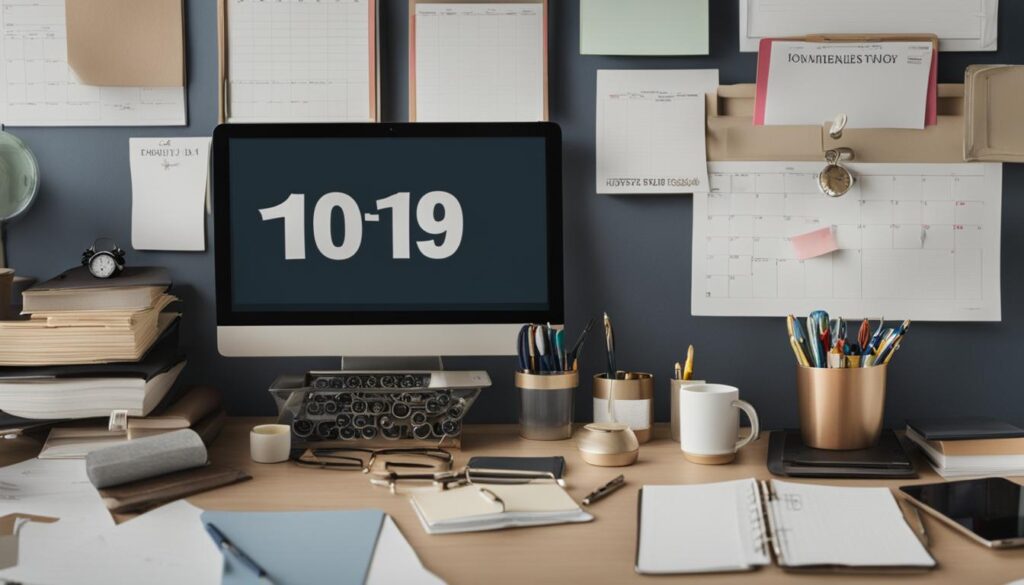
By organizing your day, setting daily goals, using calendars and schedules, and planning ahead, you can optimize your time management efforts. These strategies will help you stay focused, prioritize your tasks effectively, and accomplish more in less time. Start implementing these practices today and experience the benefits of a well-organized day.
Take Breaks
When it comes to effective time management, taking breaks is often overlooked. However, incorporating regular breaks into your workday is essential for maintaining good mental health and increasing overall productivity. Research has shown that taking breaks can have a positive impact on our well-being and efficiency.
Taking breaks allows our minds to recharge and rejuvenate, preventing burnout and reducing stress. By stepping away from our tasks for a short period of time, we give our brains a chance to rest and reset. This can help us regain focus and clarity when we return to our work. Additionally, breaks can improve our creativity and problem-solving abilities, as our minds are free to wander and make new connections.
Studies have also shown that employees who take regular breaks have better mental health and improved productivity. By allowing ourselves time to relax and recharge, we can reduce feelings of fatigue and improve our overall well-being. Taking breaks is not a sign of laziness, but rather a smart strategy to enhance our productivity and work performance.
The Key to Balance
It is important to note that taking breaks does not mean wasting time or procrastinating. Instead, it is about finding the right balance between focused work and rejuvenation. By incorporating short breaks throughout your day, you can maintain a steady level of energy and motivation. Whether it’s a short walk, a few minutes of stretching, or enjoying a cup of tea, find activities that help you relax and clear your mind.
Remember, effective time management is not just about working harder, but also working smarter. By prioritizing your mental health and making time for breaks, you can enhance your overall productivity and well-being. So, give yourself permission to take breaks and reap the benefits of improved focus, creativity, and work-life balance.

FAQ
Q: What is time management and why is it important?
A: Time management is the process of planning and organizing how to divide your time between specific activities. It is important because it helps individuals to work smarter, not harder, allowing them to get more done in less time.
Q: How can I improve my time management skills?
A: You can improve your time management skills by using time tracking software, taking control of your time, and prioritizing important tasks. It’s also beneficial to use time management techniques and strategies to better manage your time effectively.
Q: What are the key benefits of time management?
A: The key benefits of time management include improved productivity, the ability to use your time effectively, and the opportunity to focus on important things. Time management also enables individuals to have time to spend on activities they enjoy and value.
Q: How does time management help in personal and professional life?
A: Time management helps individuals to use their time better, whether it’s for personal or professional activities. It allows them to better manage their time, get essential tasks done in less time, and balance various responsibilities effectively.
Q: What are some effective time management tips?
A: Some effective time management tips include setting specific goals, using time tracking software, delegating tasks when possible, and avoiding procrastination. It’s also beneficial to identify time management strategies that work well for you and stick to them.
Q: How can time management contribute to improved productivity?
A: Time management can contribute to improved productivity by enabling individuals to focus on important tasks, eliminate time-wasting activities, and allocate time for specific activities efficiently. This allows them to achieve more in less time and produce higher quality work.
Q: What are some essential time management skills?
A: Some essential time management skills include the ability to prioritize tasks, set achievable goals, manage time effectively, and utilize time tracking techniques. It’s also important to be able to take control of your time and use time management software if necessary.
Q: Why is time management important in today’s fast-paced world?
A: Time management is important in today’s fast-paced world because it allows individuals to manage their time better amidst various responsibilities and distractions. It enables them to stay focused, meet deadlines, and maintain a healthy work-life balance.
Q: How can time management help me achieve a better work-life balance?
A: Time management can help you achieve a better work-life balance by allowing you to allocate time for work, personal activities, and relaxation. It enables you to plan and prioritize effectively, ensuring that you have time for both professional commitments and personal well-being.
Q: What does effective time management entail?
A: Effective time management entails the process of utilizing time management techniques and strategies to better manage your time. It includes setting realistic goals, using time tracking software when necessary, and ensuring that important tasks are completed efficiently.
Conclusion
Effective time management is crucial for success and well-being. It brings a range of benefits, such as reduced stress, increased productivity, and improved work-life balance. Prioritizing tasks correctly, avoiding multitasking, minimizing distractions, and staying organized are key strategies for better time management.
By implementing these tips and strategies, individuals can apply effective time management in their lives and achieve their goals more efficiently. Prioritization plays a vital role in ensuring that important tasks get the attention they deserve. Setting goals, using calendars and schedules, and planning ahead are effective ways to stay organized and manage time effectively.
Remember, effective time management is not just about working harder, but also about working smarter. By optimizing your time, you can create more opportunities, reduce stress, and enhance your overall well-being. So start applying these tips and strategies today and reap the benefits of effective time management!




